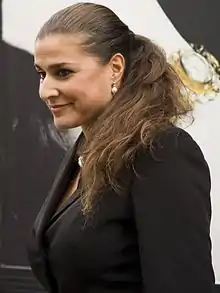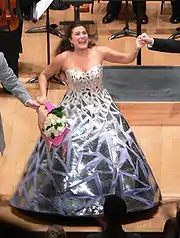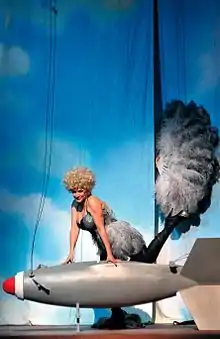Cecilia Bartoli
Cecilia Bartoli, Cavaliere OMRI (Italian: [tʃeˈtʃiːlja ˈbartoli]; born 4 June 1966) is an Italian coloratura mezzo-soprano opera singer and recitalist. She is best known for her interpretations of the music of Bellini, Handel, Mozart, Rossini and Vivaldi, as well as for her performances of lesser-known music from the Baroque and Classical period. She is known for having the versatility to sing both soprano and mezzo roles.
Cecilia Bartoli | |
|---|---|
 Bartoli at the Centre for Fine Arts, Brussels, 2007 | |
| Born | 4 June 1966 Rome, Italy |
| Education | Conservatorio di Santa Cecilia |
| Occupation | Opera singer and recitalist |
| Years active | 1987–present |
| Awards | |
| Website | www |

Biography
Bartoli is considered a coloratura mezzo-soprano with an unusual timbre. According to Nicholas Wroe, her distinctive voice is known for its "fully developed sumptuousness of the lower register, the vibrancy of the middle range...the top was limpid and powerful." She is one of the most popular (and one of the top-selling) opera singers of recent years.[1]
Early career
Bartoli was born in Rome. Her parents, Silvana Bazzoni and Pietro Angelo Bartoli, were both professional singers and gave her her first music lessons. Her first public performance was at age nine as the shepherd boy in Tosca.[2][1] Bartoli later studied at the Conservatorio di Santa Cecilia in Rome.[3] At the age of 19, she made her singing debut and appeared on the Italian television show Fantastico. She did not win the competition but was asked to sing with Paris Opera for a homage concert for Maria Callas.
Bartoli came to prominence in her early twenties. She made her professional opera debut in 1987 at the Arena di Verona. In the following year, she undertook the role of Rosina in Rossini's The Barber of Seville at the Cologne Opera, the Schwetzingen Festival and the Zurich Opera earning rave reviews.[3] Working with conductors Daniel Barenboim and Nikolaus Harnoncourt, Bartoli focused on Mozart roles, such as Zerlina in Don Giovanni and Dorabella in Così fan tutte, and from then on her career developed internationally.[3]
In 1990, she made her debut at the Opéra Bastille as Cherubino in Mozart's The Marriage of Figaro and her debut at the Hamburg State Opera as Idamantes in Mozart's Idomeneo, followed by her La Scala debut as Isolier in Le comte Ory in 1991, a performance that solidified her reputation as one of the world's leading Rossini singers.[3]
Middle career
In 1996, Bartoli made her debut at the Metropolitan Opera as Despina in Così fan tutte and returned in 1997 to sing the title role of La Cenerentola and in 1998 to sing the role of Susanna in The Marriage of Figaro. In 2000, she sang in another Mozart soprano role, Donna Elvira in Don Giovanni, at the Deutsche Oper Berlin. In 2001, she made a long-awaited Royal Opera House debut, taking the roles of Euridice and the Genio in the London stage premiere of Haydn's L'anima del filosofo.[3]
Work in Baroque music
| External video | |
|---|---|
In addition to Mozart and Rossini, Bartoli has spent much of her career performing and recording Baroque and early Classical era music by such composers as Gluck, Vivaldi, Haydn and Salieri. In early 2005, she sang Cleopatra in Handel's Giulio Cesare. She often performs with the Baroque ensemble Il Giardino Armonico.
In 2012, Bartoli produced a project entitled Mission, which premiered the works of Agostino Steffani, a not well-remembered Baroque performer. Bartoli produced the music of the composer in CD form as well as an extended music video that portrays her as the priest-composer Agostino in the palace of Versallies. The video is known for its historic and visual accuracy of the Baroque period. Cecilia Bartoli's performance and production of Mission reflect the music and aesthetic of Steffani's time period through the setting, wardrobe, and cinematography."[4]
Work in bel canto
In 2007/08, Bartoli devoted her time to studying and recording the early 19th century repertoire – the era of Italian Romanticism and bel canto – and especially the legendary singer Maria Malibran, the 200th anniversary of whose birth was celebrated in March 2008. The album Maria was released in September 2007. In May 2008, Bartoli sang the title role written for Malibran in a revival of Fromental Halévy's 1828 opera Clari at the Zurich Opera.[5] In June 2010, she sang the title role of Bellini's Norma for the first time with conductor Thomas Hengelbrock in a concert at the Konzerthaus Dortmund.[6] In March 2011, Bartoli toured five Australian cities with two programs drawn from Sacrificium and Maria.[7]
Salzburg

In 2012, Bartoli became the artistic director of the Salzburg Whitsun Festival, an extension of the traditional Salzburg Festival, which produces performances during Whitsun (Pentecost) weekend. Forgoing the academic programming of her predecessors, she reformulated the festival's programming—returning to "the old recipe of organizing beautiful programs and inviting great artists"—resulting in record ticket sales and placing the festival on the international opera calendar. In 2012, she sang Cleopatra in Handel's Giulio Cesare, in 2013 the title role in Vincenzo Bellini's Norma, and in 2014 Rossini's La Cenerentola.[8]
Personal life
Bartoli lives with her husband, Swiss baritone Oliver Widmer, in Zollikon on the Goldcoast shore of Lake Zurich, Switzerland, and in Rome, part of the year. The couple married in 2011 after twelve years together.[9] Bartoli lived in Monaco in the early 2010s.[10]
Awards and honours
Bartoli was appointed Chevalier of the French Ordre des Arts et des Lettres (1995), and Commander of Monaco's Order of Cultural Merit (November 1999)[11]
In 2003, she received the Brit Award for Outstanding Contribution to Music at the Classic Brit Awards.
In 2010, she was awarded the Honorary Degree of Doctor of Music from University College Dublin.[12]
In 2011, she won a fifth Grammy Award for Best Classical Vocal Performance for Sacrificium.[13] In 2012, she was voted into the magazine's Gramophone's Hall of Fame.[14] She is the 2012 recipient of the Herbert von Karajan Music Prize.
Discography
Opera
- Rossini: La scala di seta (Fonit Cetra, 1988)
- Rossini: Il barbiere di Siviglia (Decca, 1989)
- Mozart: Così fan tutte (Erato, 1990)
- Mozart: Lucio Silla (Teldec 1991)
- Rossini: La Cenerentola (Decca, 1993)
- Puccini: Manon Lescaut (Decca, 1993)
- Mozart: Le nozze di Figaro (DG, 1994)
- Mozart: La clemenza di Tito (Decca, 1995)
- Haydn: L'anima del filosofo, ossia Orfeo ed Euridice [15](Decca, 1997)
- Rossini: Il turco in Italia (Decca, 1998)
- Mozart: Mitridate (Decca, 1999)
- Haydn: Armida (Teldec 2000)
- Handel: Rinaldo (Decca, 2000)
- Mozart: Don Giovanni (Arthaus, 2001, DVD)
- Bellini: La sonnambula (Decca, 2008)
- Halevy: Clari (Decca, 2008, DVD)
- Bellini: Norma (Decca, 2013)
Recitals with orchestra
- Rossini Arias (1989)
- Mozart Arias (1991)
- Rossini Heroines (1992)
- Mozart Portraits (1994)
- Mozart Arias (1996)
- The Vivaldi Album (1999)
- Cecilia and Bryn (1999)
- Gluck Italian Arias (2001)
- The Salieri Album (2003)
- Opera Proibita (2005)
- Viva Vivaldi! Arias & Concertos (Arthaus, 2005, DVD)
- Maria (A Tribute to Maria Malibran) (2007)
- Sacrificium (Arias written for castrati) (2009)
- Mission (Arias and duets of Agostino Steffani) (2012)
- St. Petersburg (2014)
- Antonio Vivaldi (2018)
- Farinelli (2019)
Recitals with piano
Recitals with cello
- Dolce Duello: Cecilia & Sol – with Sol Gabetta (Decca Classics) released 11 November 2017
Sacred
- Rossini: Stabat Mater (1990)
- Mozart: Requiem (1992)
- Scarlatti: Salve Regina, Pergolesi: Stabat Mater, Salve Regina (1993)
- Rossini: Stabat Mater (1996)
Cantatas
- Rossini Cantatas Volume 2
Compilations
- A Portrait (1995)
- The Art of Cecilia Bartoli (2002)
- Sospiri (2010)
References
- Wroe, Nicholas (13 October 2001). "The Guardian profile: Cecilia Bartoli – Classic case of success". The Guardian. Retrieved 29 December 2013.
Bartoli is not only selling more CDs than ever before, she is doing so with a repertoire that would have been thought arcane even at the height of the classical boom
- Her mother's song got some peasant power (in Italian)
- Blyth, Grove Music Online
- Caverly, C. "Bartoli's Mission: A Modern Woman and Baroque Music." MHS 123 Music and Technology in the Twentieth Century, 28 November 2017
- Loomis, George (27 May 2008). "Zurich Opera and Cecilia Bartoli revive Halévy's opera Clari". International Herald Tribune. Retrieved 3 March 2009.
- Julia Gaß (30 June 2010). "Norma-Debüt der Bartoli mit Jubelorkan gefeiert". Ruhr Nachrichten (in German). Archived from the original on 7 October 2011. Retrieved 1 July 2010.
- "Flying visit" by Hugh Canning, The Australian (12 February 2011)
- Loomis, George (28 May 2014). "Cecilia Bartoli Soars at Salzburg". The New York Times. Archived from the original on 16 July 2014. Retrieved 1 September 2014.
- "Cecilia Bartoli Makes The Gold Coast and Rome Her Home". Archived from the original on 28 March 2012. Retrieved 28 August 2012.
- Alan Jackson. "Cold Call Alan Jackson calls Cecilia Bartoli.", The Times, London, 10 May 2003
- Sovereign Ordonnance n° 14.274 of 18 November 1999 : promotions or nominations
- , "World-leading Mezzo-Soprano, Cecilia Bartoli honoured by UCD" Retrieved 11 October 2020
- Past Winners Search, grammy.com
- "Cecilia Bartoli (mezzo-soprano)". Gramophone. Retrieved 11 April 2012.
- "Discography listing". www.allmusic.com. Retrieved 19 August 2020.
Sources
- Blyth, Alan: "Cecilia Bartoli", Grove Music Online ed. L. Macy (Accessed 20 October 2008), (subscription access)
- Chernin, Kim, and Renate Stendhal. Cecilia Bartoli: the Passion of Song. Women's, 1999.
External links
| Wikimedia Commons has media related to Cecilia Bartoli. |